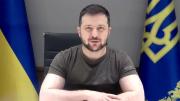Ukrainian President Volodymyr Zelenskyy addressed leaders of American research universities Monday during an online question-and-answer session hosted by the Association of American Universities, of which Harvard is a member. The event was largely focused on Ukraine’s higher-education sector, which has been devastated by the Russian invasion, and how American universities can work with Ukrainian educators and officials to rebuild. In an email inviting members of the Harvard community to listen in to the session, Mark C. Elliott, vice provost for international affairs, wrote: “The invasion—which has resulted in the deaths of thousands of innocent civilians and the widespread destruction of homes, schools, hospitals, and whole cities—has brought trauma to Ukrainians around the globe, including members of the Harvard community, and provoked great distress among those who stand with them.” Elliott added that the University “continues to support all members of our community who are affected by the conflict,” and pointed to the list of Harvard resources available to affected students and scholars both on campus and abroad. He also noted the newly formed Ukrainian Global University, an international network of nearly 50 institutions (though Harvard is not among them) working to help displaced Ukrainian students and scholars. In his remarks, Zelenskyy also spoke about the Ukrainian Global University.
During the hourlong event, the leaders of several universities asked the Ukrainian president about the situation of faculty and students (including not only college students, but also younger schoolchildren) in his country, about how American research institutions can help rebuild universities and curricula, how to more effectively identify individual academics in Ukraine who need help, and how to support the return of those displaced after the war ends.
In his prepared remarks, Zelenskyy spoke not to university administrators, but directly to American university students. Drawing a parallel between the plight of Ukraine and videos of bullying incidents uploaded to social media, he spoke of the responsibility in the choice to watch or to help, “whether to do anything when you witness injustice.” He urged American students to be “actors in life,” not merely observers, and to join Ukraine’s fight in the war with Russia. “If you don’t want to be a victim or an indifferent bystander,” he said through a translator, “you should instead be fighters for democracy, guardians of democracy, because that’s how you defend your own way of life, your people, your outlook.”









